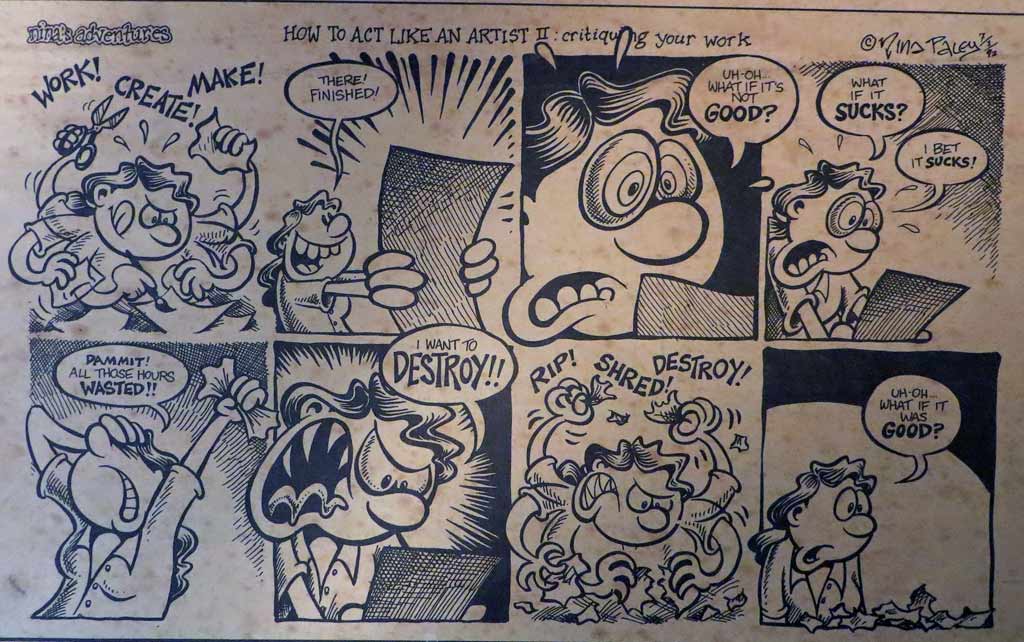
For this discussion, PTCS means “Post Traumatic Critique Syndrome” and Defectology, means focusing on lack and limitation.
A Story
I can still see my Beginning Painting instructor’s bushy 70s walrus mustache motating as he critiqued – no, outright criticized – my certainly awful attempt at the current assignment: paint a self-portrait as a famous person. On a 3’x4′ canvas I had modeled a full-bodied gesture of Greek-robed, barefooted Isadora Duncan in mid-bound and was having trouble putting my features onto it at all convincingly. I particularly remember the mustache’s emphatic contract/expand curl as he sneered the word “dumpy” in slow motion. “IS-a-dora DUN-can WAS NOT DUM-PEE! ” he intoned as he was actually looking down his nose at me.
Thing is, this guy worked hard in his critiques at tearing apart the whole line-up of our work. I was not singled out here, but by the time he got to me I was seething. At the sight of that slo-mo sneering ‘stache, I blinked. Out of hot shame and powerlessness, I sputtered back with all I had: my born fightin’ Ulster-Scot sense of justice and fairplay. “We already know our work is bad!!!!!” I yelped, “Why don’t you help us see what’s good about it???? Or at least suggest what we could try to make it better????”
I wish I could tell you what happened afterwards, or even the rest of the semester, but soon after that episode I had an emergency appendectomy and took an Incomplete. Within the year allowed to remedy the INC, I returned to his office with several other paintings I had done without the torment of his criticism. I got a B. Not sure it’s a direct consequence, but I have never taken another painting class.
The Botherations
Most artists have an art bully story – or several – seared into touchy neuron pathways. It could have come from an insensitive teacher, a competitive passive-aggressive colleague, an anonymous troll, a gatekeeper: say a gallerist or a juror, and especially from a clueless tone-deaf friend or family member. Regardless, we made decisions in that moment about our creativity, our vulnerability, our worth. Our failings and incompetencies took the wheel: Defectology In Action.
If we dared continue the waltz with our muses – and I know a few who slunk off the dance floor forever – we still have that story and our decisions about it rumbling around our psyche, popping up unbidden when we sense a new threat. PTCS In Action.
Sometimes the bully is us. We suffer that internalized inner critic, the perennial doubter who steps in with poisonous cautionary bunkum before we even get up in the morning. I saved that Nina Paley cartoon up top because it captures the whole schizo conversation. Defective thought/feels about our defects. And I’m not even going into how it smells up our successes with Impostor Syndrome.
Troublesome stuff!
What’s Good About It?
I dunno.
It would be much better to not have to go this rocky route down the creative highway. To never feel so small, so voiceless and full of dread. So painfully vulnerable. To never have such resentment, either. Yet, it’s clear that’s not gonna happen, because that shit already went down. To yearn for that impossibility is to prolong the problem.
I have a few clues about what helps, though. No advice about what works, because there isn’t any cure-all, just a smorgasbord of possibles that shine beams into the darkness. Beacons or no, it will always be YOU doing the work to stand back up. While you’re laying there, awash in your haunted defectiveness, here are a few points to consider.
- Telling the truth about what happened and especially about what you have decided and done in response. Digging that canker out of there and shining the light on it. Maybe the Great Oz becomes the little man behind the curtain, maybe not, but you have met the enemy infiltration, even if it’s you.
- Humor, wry and dark. Jollying yourself. Watching the fabulous human comedy at work. Sassing back. See The Art of Rejection by Arthur Gonzalez.
- Writings on creativity, creative process, inner critics, and all that jazz. I just ran across a book I would buy for the title alone: Your Inner Critic is a Big Jerk: And Other Truths About Being Creative by Danielle Krysa. None of these folks have The Answer either, but when you find those that speak in your language you will get a boost and a breather.
- Taking a break. Speaking of breathers, you can always step away for a bit. Once you have gotten through No. 1, that is. This is not denial, it’s assimilation. Do other stuff. Cook. Play. Party. Sleep. Travel. Gather.
- Think about Richard Bach’s words, “Argue for your limitations and sure enough, they’re yours.” And an important corollary: If you eventually decide you’re just fine, defects and PTCS and all, you are.
–Liz Crain, who sees that there’s no moral here, no summation, no way to end it, really. Just fold your pain and suffering into that honeycake batter and bake it up. Well, maybe there’s one caveat. From Stephen Hawking, no less. “Remember to look at the stars and not your feet.” Now to see about a painting class.
Good one, Liz. Lately this sentiment has been very present in my life, so true; “Beacons or no, it will always be YOU doing the work to stand back up.”
Yeah, that complete ownership of our problems/process is a tough one, but also the key. As a wry gentleman just told me about his thoughts; “That’s dangerous country up there between my ears.” Well, even so, it’s ours, right!?!
If there is no constructiveness to a critique then it is just a criticism.
Exactly! And this instructor did not know that…